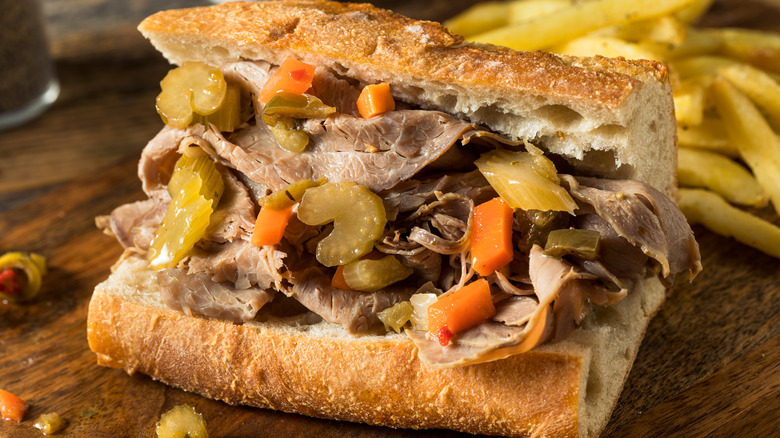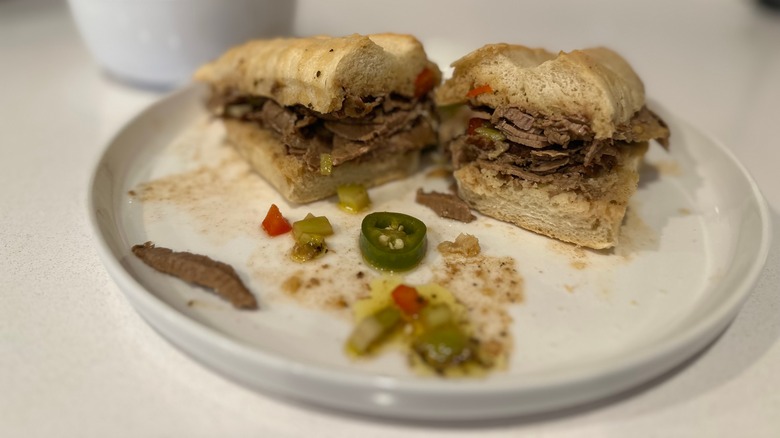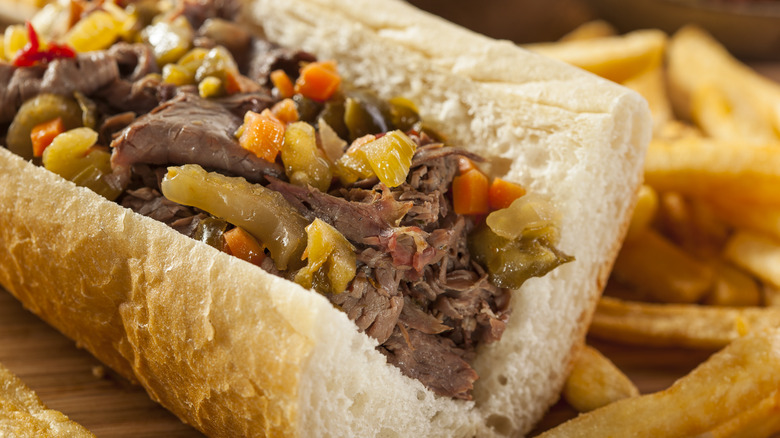How The Italian Beef Became A Chicago Icon
Most people outside of Chicago associate the Windy City's cuisine with two dishes. First and foremost, there is Chicago deep-dish pizza, ever the center of "is it really pizza" debates. Right behind it is the Chicago-style hot dog, famed for its ardent anti-ketchup stance. It's curious how these two dishes came to define the perception of Chicago cuisine, and it must in no small part be due to the fact that they are often framed as rivals of New York City's own pizza and hot dogs. In truth though, neither deep-dish pizza nor hot dogs is the true Chicago signature. Ask the locals, and they will almost surely give that title to the Italian beef.
The Italian beef is a sandwich, but you won't hear it called "Italian beef sandwich" because the dish is so ubiquitous to Chicagoans, no qualifier is necessary. It is made with a lean cut of beef, typically sirloin or top round. The meat is slow-roasted and sliced very thin before getting a bath in au jus made from the drippings accumulated in the roasting process. It is served on a French roll with either roasted pepper or Italian giardiniera. The final result is the juiciest sandwich you'll ever eat, and some people even take it up an extra notch by dipping the whole affair, bread and all, into the au jus. It's won hearts across Chicago, not just as a meal, but as an emblem of Italian-American history.
The Italian beef may have originated at a wedding
There are a few competing theories regarding the origin of the Italian beef, but the man most often credited with its invention is Anthony Ferreri. Right around the time that World War I ended, Ferreri was a street vendor who traveled around Chicago selling cold sandwiches. His big break came after he attended a peanut wedding. "What in the world is a peanut wedding?" you may ask. It is an old practice that you don't see much these days, but it was once an emblem of the Italian-American experience.
Chicago experienced a large wave of Italian immigrants in the early 1900s. They typically had little money, a problem that grew even worse after WWI, as the Great Depression descended on the nation. Consequently, many Italian-Americans of that era couldn't afford an extravagant wedding, so they were often held in couples' family homes, with a small food budget. Peanuts were served, and so were beef sandwiches. Chicago, famous throughout its history as a meat-packing hub, offered beef aplenty.
The beef sandwiches at peanut weddings weren't the Italian beefs we know today. The beef was sliced much thicker, but Ferreri realized that if he sliced it thinner, he could get more sandwiches out of it and feed a bigger crowd. Thus began the modern Italian beef.
Competing theories about the Italian beef's origin
Anthony Ferreri's son, Al, would go on to open Al's Beef in 1938, which is still in business today. In an interview with Newcity, Al's nephew and current Al's Beef owner, Chris Pacelli Jr., revealed that his uncle actually opened the business as a front for illegal gambling after he had done jail time for organized crime connections. What was initially meant as a front became a legitimate business when the sandwiches started selling like hotcakes. They became particularly popular with blue-collar workers. Al's Beef also stayed open late so that other Italian-Americans, a majority Catholic group who traditionally didn't eat meat on Fridays, could get their beef fix as soon as the clock struck midnight on Saturday.
Today, Pacelli continues to argue for his family's claim to the Italian beef, but there are competing theories. Many believe that it was not Anthony Ferreri who invented the Italian beef, but rather Pasquale Scala, whose story happens to be very similar to Ferreri's. Scala also sold street food, supplying many peanut weddings, and later owned a meatpacking company. He purportedly hit on the same idea of thinly-slicing beef, and later became a prominent supplier of meat to Italian beef joints. It's impossible to say which origin story is true, but whoever is really responsible for the Italian beef is owed an immeasurable debt of gratitude by the city of Chicago, as well as foodies everywhere.


